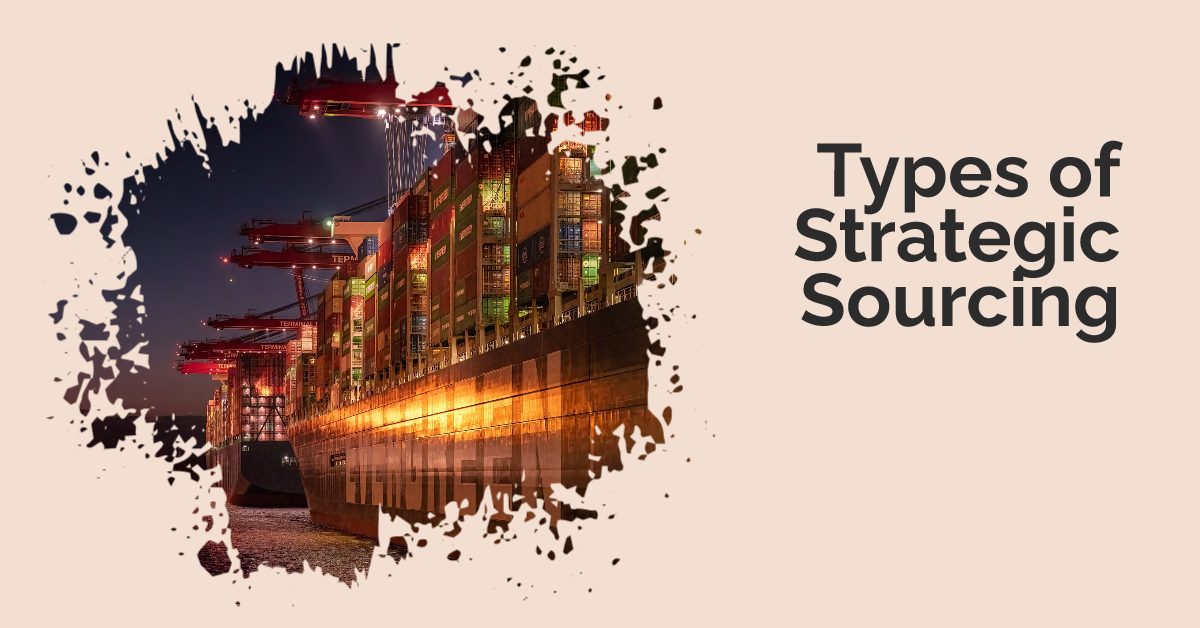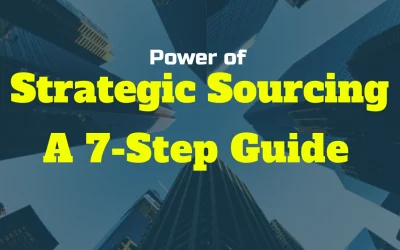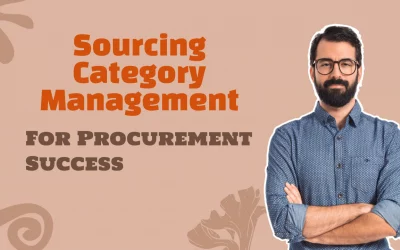Strategic sourcing is not just a buzzword; it’s a structured approach that can revolutionize your procurement activities. This article delves into the types and benefits of strategic sourcing, providing actionable insights for businesses looking to optimize their supply chain and reduce costs.
What is Strategic Sourcing?
Strategic sourcing is a procurement method that focuses on long-term goals rather than short-term needs. It’s about aligning your sourcing strategies with your business objectives to achieve cost savings, improve efficiency, and build strong supplier relationships. If you’re interested in diving deeper into this topic, you can explore our comprehensive 7-step guide to the power of strategic sourcing.
Traditional sourcing methods often focus solely on cost-cutting. However, strategic sourcing takes a more holistic approach, considering factors like supplier relationships, quality of goods and services, and long-term returns and risks.
Key Takeaway: Strategic sourcing goes beyond cost-cutting to deliver long-term value.
How Phycomex Can Help
At Phycomex, we specialize in energy information services and have a unique focus on negotiating with oil price reporters. Our strategic sourcing solutions can help you optimize your procurement activities, reduce costs, and gain a competitive advantage.
The Procurement Landscape
Procurement is an essential function in any organization, responsible for acquiring goods and services. Strategic sourcing elevates procurement from a transactional activity to a strategic one. For more insights, you can read our article on strategic procurement planning.
The Role of Technology in Procurement
Advancements in information technology have revolutionized procurement activities. Procurement software and systems enable businesses to automate various functions, making the process more efficient and data-driven.
Types of Sourcing
There are various types of sourcing strategies that businesses can adopt, each with its pros and cons. Whether it’s direct sourcing, where you buy directly from the manufacturer, or indirect sourcing, which involves using intermediaries like wholesalers or retailers, the choice depends on your business needs. To understand the nuances of these strategies, you can learn more about sourcing category management here.
Global vs. Local Sourcing
Some businesses prefer sourcing goods and services from local suppliers to reduce supply chain risks, while others opt for global sourcing to take advantage of cost benefits. Each approach has its own set of challenges and opportunities.
Benefits of Strategic Sourcing
Strategic sourcing offers a plethora of benefits that go beyond mere cost savings. It can significantly improve your business efficiency by streamlining the procurement process and optimizing the supply chain. Some of the key benefits include risk mitigation, improved supplier relationships, and process optimization. To delve deeper into how you can reap these benefits, check out our guide on effective strategic sourcing.
Quantifiable and Non-Quantifiable Benefits
While cost savings are easily quantifiable, strategic sourcing also offers non-quantifiable benefits like supplier innovation, improved quality, and better compliance.
Table: Summary of Benefits
| Benefit |
Description |
| Cost Savings |
Reduces the total cost of ownership |
| Efficiency |
Streamlines procurement and sourcing processes |
| Risk Mitigation |
Identifies and plans for potential risks |
The Sourcing Process
Understanding the sourcing process is crucial for implementing a successful strategic sourcing strategy. The process involves several steps, from identifying needs and analyzing spend to selecting suppliers and managing contracts. For a detailed breakdown of each step, explore our strategic sourcing templates.
Spend analysis is an essential part of the sourcing process. It helps businesses understand their spending patterns and identify opportunities for cost reduction and efficiency gains.
Supply Chain Management
Strategic sourcing plays a pivotal role in supply chain management. It helps in optimizing the flow of goods and services from suppliers to customers, thereby enhancing the overall efficiency and effectiveness of the supply chain. To understand how strategic sourcing can transform your supply chain, read our article on strategic sourcing services.
The Role of Strategic Sourcing in Supply Chain Risk Management
Strategic sourcing can help mitigate various supply chain risks, such as supplier failure, geopolitical issues, and market volatility. It allows businesses to develop contingency plans and alternative sourcing strategies.
Sourcing and Procurement
While sourcing and procurement are often used interchangeably, they serve different functions. Sourcing is the process of identifying suppliers, while procurement involves the actual purchasing of goods and services. However, both are integral parts of a successful strategic sourcing strategy. To understand the synergy between these two, read our guide on the procurement cycle for optimal business performance.
Sourcing sets the stage for procurement by identifying potential suppliers, negotiating terms, and ensuring quality standards. Procurement takes over from there, managing the actual purchase orders, deliveries, and payment processes.
Outsourcing as a Sourcing Method
Outsourcing is a popular sourcing method where businesses delegate certain tasks or functions to external vendors. It can be an effective way to reduce costs and focus on core competencies. If you’re considering outsourcing as a sourcing method, learn why using a procurement consultant can be beneficial.
Outsourcing vs. Insourcing
Outsourcing is often contrasted with insourcing, where tasks are performed in-house. Each has its own set of advantages and disadvantages, and the choice between the two often depends on factors like cost, expertise, and the nature of the task.
Strategic Sourcing in the Energy Sector
Strategic sourcing in the energy sector has its unique set of challenges and opportunities. With the volatile nature of energy prices, strategic sourcing can provide a competitive edge. For more insights into how strategic sourcing can benefit the energy sector, explore our article on oil production data.
Energy-Specific Challenges
The energy sector faces unique challenges such as regulatory compliance, environmental considerations, and geopolitical risks. Strategic sourcing can help navigate these complexities by choosing suppliers who meet stringent criteria.
Conclusion
Strategic sourcing is more than just a procurement strategy; it’s a comprehensive approach that can significantly impact your business’s bottom line. By understanding the different types of sourcing and implementing a well-thought-out sourcing strategy, you can achieve cost savings, improve efficiency, and gain a competitive advantage. For those looking to implement or improve their strategic sourcing efforts, check out our guide on strategic sourcing goals.
How Phycomex Can Help
Phycomex offers tailored strategic sourcing solutions with a unique focus on the energy sector. Our expertise in energy information services and negotiating with oil price reporters can help you optimize your procurement activities, reduce costs, and gain a competitive advantage.
FAQ
What is the difference between procurement and supply chain management?
Procurement refers to the process of acquiring goods or services, often carried out by specialized procurement teams within a company. Supply chain management, on the other hand, involves overseeing the entire flow of goods and services from suppliers to customers.
While procurement is a function within the supply chain, supply chain management is broader and includes aspects like logistics, inventory management, and contract management.
How does the strategic sourcing process differ from traditional procurement approaches?
The strategic sourcing process is a more comprehensive approach to procurement that goes beyond just finding the best services at a price point. It considers various factors such as quality of goods or services, long-term supplier relationships, and market research.
Unlike traditional procurement approaches, which are often based on price alone, strategic sourcing aims for cost and waste reduction while maximizing value.
What role does technology play in modern procurement and sourcing?
Information technology plays a significant role at both tactical and strategic levels of procurement and sourcing. Modern procurement systems and strategic sourcing software enable procurement professionals to automate tasks, conduct market research, and manage contracts more efficiently.
This technology helps connect a network of independent companies, allowing them to share skills and resources for better outcomes.
What is single-source purchasing, and how does it fit into a strategic sourcing strategy?
Single-source purchasing refers to purchases made from a single supplier. While this approach can simplify procurement functions and reduce supply chain costs, it may also expose the company to supply risks.
In a strategic sourcing strategy, single-source purchasing is often characterized by shared ownership of the risks and rewards between the two or more parties involved. The goal of strategic sourcing in this context is to mitigate supply risks while ensuring a stable supply of quality products.
How do companies implement a successful sourcing strategy?
Implementing a successful sourcing strategy involves multiple steps, from understanding sourcing requirements to making informed sourcing decisions. It requires a new range of skills within the company, including market research, contract management, and negotiation.
The approach to procurement should align with the overall business strategy and may involve diverse supply options, including global supply chains. Strategic sourcing helps in achieving this by offering a structured process that considers both immediate needs and long-term goals.






0 Comments